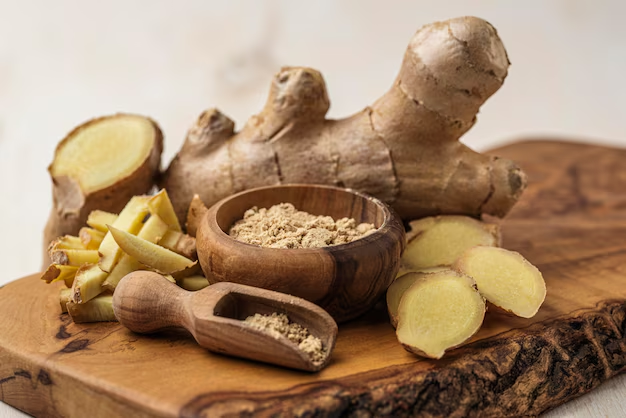Ginger has been a cornerstone of traditional medicine and culinary arts for centuries. Known for its sharp, warm flavor, this root has been celebrated for its health-promoting properties across cultures. In the U.S., ginger is gaining popularity not only as a spice but also as a powerful natural remedy. This article delves into the question: Is ginger healthy? We’ll explore its health benefits, nutritional profile, and important considerations to keep in mind.
What Is Ginger?
Ginger, scientifically known as Zingiber officinale, is a flowering plant whose root is widely used in cooking and medicine.
Botanical and Historical Background
Native to Southeast Asia, ginger has been cherished for thousands of years in Ayurvedic, Chinese, and Middle Eastern medicine. Its distinctive taste and aroma come from its natural oils, particularly gingerol—a bioactive compound with potent medicinal properties.
Forms of Ginger
In the U.S., ginger is available in various forms, including:
- Fresh Ginger: Sold in whole root form, often used in cooking or teas.
- Dried or Powdered Ginger: Convenient for baking, seasoning, or brewing.
- Ginger Supplements: Available as capsules, extracts, or gummies for targeted health benefits.
- Candied Ginger: A sweetened form, often enjoyed as a snack or remedy for nausea.
Nutritional Profile of Ginger
Ginger is not just flavorful; it’s packed with nutrients and bioactive compounds that offer multiple health benefits.
Key Nutrients and Compounds
- Gingerol: The primary bioactive compound, known for its anti-inflammatory and antioxidant properties.
- Vitamins: Contains small amounts of Vitamin B6 and Vitamin C.
- Minerals: Provides potassium, magnesium, and manganese, essential for various body functions.
- Caloric Content: A low-calorie ingredient with just 80 calories per 100 grams.
Ginger’s nutrient density makes it a healthy addition to your diet without significantly increasing calorie intake.
Health Benefits of Ginger
Ginger offers a wide array of health benefits, backed by science and centuries of traditional use.

Anti-Inflammatory and Antioxidant Effects
Ginger plays a critical role in reducing inflammation and oxidative stress, both of which are linked to chronic diseases.
- How It Works: Gingerol helps lower markers of inflammation, such as C-reactive protein.
- Scientific Support: Research highlights its effectiveness in conditions like arthritis, where inflammation is a major concern.
- Antioxidant Role: Neutralizes harmful free radicals, protecting cells from damage and aging.
Digestive Health
Ginger is renowned for its ability to soothe the stomach, cure acid reflux, and improve digestion.
- Nausea Relief: Ginger has been widely used to alleviate nausea from morning sickness, motion sickness, and chemotherapy.
- Improved Digestion: It stimulates digestive enzymes, aiding in smoother digestion.
- Reduction of Bloating: Ginger helps relax the gastrointestinal tract, reducing bloating and discomfort.
Pain Reduction
Chronic pain conditions often see improvement with ginger use.
- Muscle Soreness: Regular consumption of ginger can reduce exercise-induced muscle soreness by up to 25%.
- Osteoarthritis Relief: Studies show that ginger extract can alleviate joint pain and stiffness, particularly in knee osteoarthritis.
- How to Use: Incorporating ginger tea or supplements into your routine may offer noticeable pain relief.
Cardiovascular Health
Ginger supports heart health by positively influencing blood pressure and cholesterol levels.
- Blood Pressure Control: Compounds in ginger relax blood vessels, improving circulation and lowering blood pressure.
- Cholesterol Reduction: Studies suggest that ginger can reduce LDL (“bad”) cholesterol levels, a major risk factor for heart disease.
- Supporting Evidence: Institutions like UCLA Health endorse ginger as part of a heart-healthy diet.
Blood Sugar Regulation
For those managing diabetes, ginger may offer significant benefits.
- Blood Sugar Impact: Ginger improves insulin sensitivity and lowers fasting blood sugar levels.
- Diabetes Management: Its ability to reduce HbA1c levels makes it a valuable addition for diabetes care.
- Scientific Validation: Clinical trials have shown promising results in controlling blood sugar levels with ginger supplementation.
Immune Support
Ginger enhances the immune system, helping the body fight infections and recover faster.
- Fighting Infections: Ginger’s antimicrobial properties combat bacteria and viruses.
- Cold and Flu Remedy: Drinking ginger tea can soothe a sore throat and reduce congestion during colds.
- Enhanced Immunity: Regular consumption boosts the body’s defense mechanisms, reducing illness frequency.
Uses of Ginger in Daily Life
Ginger’s versatility extends beyond its health benefits. It plays a significant role in daily life through its culinary, medicinal, and therapeutic uses. Whether enhancing the flavor of a dish or providing natural remedies, ginger is a staple worth incorporating into your routine.
Culinary Applications
Ginger is a beloved ingredient in kitchens worldwide, including American cuisine.
Popular Recipes
- Savory Dishes: Ginger adds a unique depth to stir-fries, marinades, and soups.
- Baked Goods: Gingerbread cookies, cakes, and muffins are iconic desserts with this root as a star ingredient.
- Beverages: Fresh ginger is commonly used in teas, smoothies, and cocktails for its vibrant, spicy kick.
Enhancing Flavors
Its warm, zesty flavor profile complements sweet and savory recipes. In marinades, ginger tenderizes meats while adding complexity to the flavor.
Medicinal and Therapeutic Uses
Ginger’s medicinal uses are deeply rooted in traditional practices and modern health trends.
Forms of Ginger Supplements
Ginger is available in various therapeutic forms:
- Capsules and Extracts: Convenient for targeting specific health issues, like nausea or inflammation.
- Powders: Often mixed with water or juices for quick relief.
Ginger Tea and Shots
- Preparation: Boil fresh ginger slices in water to make a soothing tea. For ginger shots, blend fresh ginger with lemon juice and honey.
- Benefits: Relieves sore throat, reduces bloating, and boosts immunity.
- Health.com Recommendation: Incorporate these into your morning routine to kickstart digestion and energy levels.
Considerations and Potential Side Effects
While ginger is generally safe, understanding its recommended usage and potential risks is essential.
Recommended Daily Intake
The ideal amount is 1-2 grams per day for most adults. Consuming more than 4 grams daily may lead to side effects.
Possible Side Effects
- Heartburn or upset stomach in sensitive individuals.
- Increased risk of bleeding when combined with blood-thinning medications.
Special Considerations
- Pregnant Women: Moderate consumption can help with nausea, but always consult a doctor.
- Health Conditions: Those with gallstones or certain chronic diseases should use ginger cautiously.
How to Incorporate Ginger into Your Diet
Adding ginger to your diet is simple and rewarding.

Tips for Selecting Fresh Ginger
- Look for firm roots with smooth, taut skin.
- Avoid pieces with soft spots or wrinkles.
Storage Methods
- Fresh Ginger: Store in the refrigerator for up to three weeks.
- Peeled Ginger: Freeze in an airtight container for longer shelf life.
Easy Ways to Use Ginger
- Add grated ginger to salad dressings, marinades, or stir-fries.
- Brew ginger tea for a warm, soothing beverage.
- Blend into smoothies for a spicy, nutritious boost.
Related to Read: Does Ginger Ale Contain Caffeine?: A Detailed Guide
Conclusion
Ginger is more than just a spice; it’s a functional food with diverse culinary, medicinal, and therapeutic applications. Whether enhancing flavors in dishes or supporting your health, this root is a must-have in every household.
While its benefits are numerous, always consult a healthcare provider before making significant changes to your diet or starting ginger supplements.
Frequently Asked Questions (FAQs)
1. Is it safe to consume ginger every day?
Yes, moderate daily consumption is generally safe and beneficial.
2. Can ginger help with weight loss?
Ginger supports weight loss by improving digestion and reducing appetite.
3. What is the best form of ginger to take for health benefits?
Fresh ginger or powdered forms are versatile, but supplements are convenient for targeted benefits.


